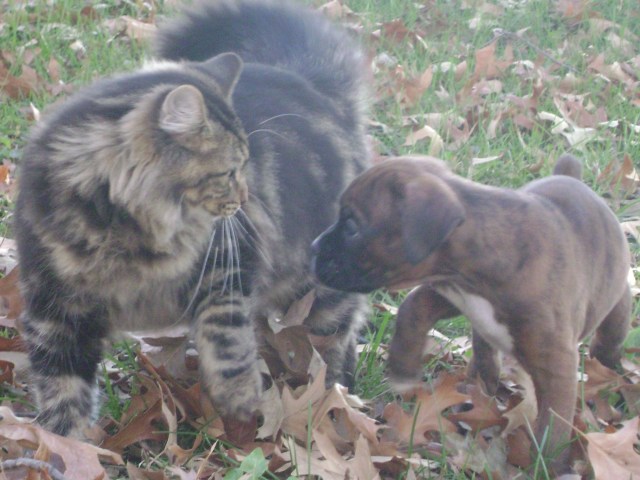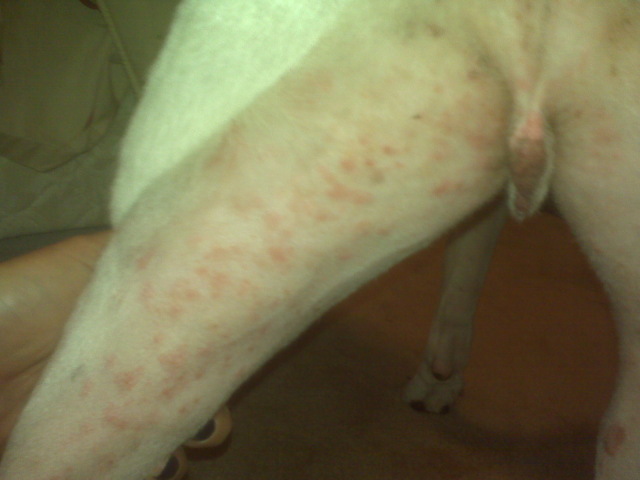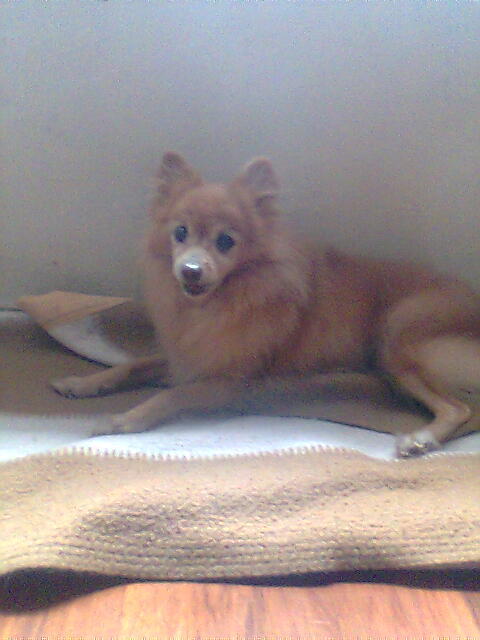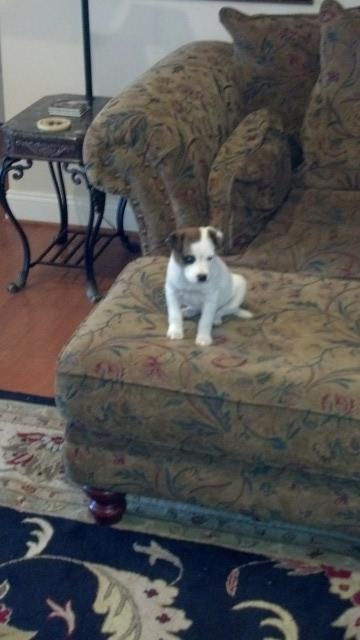QuestionQUESTION: I have a 4-year-old female mini schnauzer I adopted a year ago. Until now she has been a PERFECT dog...obedient, easy, housebroken, etc.
She was a breeding dog that I had spayed 4 months ago.
For the past year I'd been working out of the house. There was never a problem with her urinating in the house while I was gone. But for the past 7 months I've been working out of the house and therefore am home all day.
A new problem has arisen. Now, when I go out and leave her she urinates on carpet and/or sofa. This makes me furious and frustrated because it seems like it's pure spite.
I don't want to have to crate her every time I leave the house. Can you suggest anything I can do to prevent her from urinating when I leave and still give her the run of the house?
ANSWER: It could be stress or just not being able to go all day. Being loose in the house and more active makes it even worse. I don't think leaving her all day is good. Having a neighbor or a professional dog walker give her a mid daybreak could make a big difference. Another alternative is doggy day care.
Leaving her in the crate might work, but I would hate to see her go all day.
---------- FOLLOW-UP ----------
QUESTION: Hi again. I think you may have misunderstood my problem...let me try to simplify it...
I am home all day with the dog now. When I leave, she urinates on the sofa. This, to me, is spiteful behavior.
She is an adult dog who goes out at least 3 times a day, so it's not that she has to go to relieve herself. It seems she is punishing me for leaving her.
AnswerThere are those that will tell you exactly what a dog is thinking, or at least what they think the dog is thinking. Others like psycho babble such as ''separation anxiety''. I think we can safely say she reacts poorly to being left alone for even reasonable periods. What is going on, spite, stress, frantic activity stimulating urination? I would try the crate. There is a risk of her having past bad experiences being confined long periods.
It is only natural that a puppy resists its crate at first. What the puppy
wants more than anything else is to be others, you, anyone else in the
household, and any other pets. In our modern society, even if we are home,
other things distract us from the attention an uncrated puppy must have. The
only real solution is to crate the dog when you aren't around. The dog may be
happier in its den than loose in the house. It relaxes, it feels safe in its
den. It rests, the body slows down reducing the need for water and relieving
itself. Dogs that have been crated all along do very well. Many of them
will rest in their crates even when the door is open. I think the plastic
ones give the dog more of a safe, enclosed den feeling. Metal ones can be put
in a corner or covered with something the dog can't pull in and chew. Select
a crate just big enough for the full grown dog to stretch out in.
Leave it some toys. Perhaps a Kong filled with peanut butter. Don't leave
anything in the crate the dog might chew up. It will do fine without even any
bedding. You will come home to a safe dog and a house you can enjoy.
A dog that has not been crated since it was little, may take some work.
Start out just putting its toys and treats in the crate. Praise it for going
in. Feed it in the crate. This is also an easy way to maintain order at
feeding time for more than one dog.
The "shut the puppy in a safe room" is a fallacy. Very few houses even have a
safe room. How many of us have a room with a hard surfaced floor and nothing
else? Most rooms have electrical cords to chew if nothing else. In addition
to destroying anything a bored puppy finds to chew, it may choke or have
intestinal blockage from the pieces. I had a friend that left her dog in a
"safe" room. It ate a hole in the floor covering. The safe rooms fail to
give the dog the comfort of the enclosed space their instinct requires. Nor
do they restrict activity extending the time the dog can go without relieving itself.
Small crates, right for her, are fairly inexpensive. The books all say never, but she may urinate in it. That is easy to cope with the same way I control the inevitable accidents with a new puppy. I prefer the more enclosed, den like plastic ones. Skip the bedding. At first it gets wet, and later it can be chewed into choking hazards. A wire grid in the bottom will help keep the puppy up out of
accidents at first. They are available with the crates, but expensive and hard to find. A piece of closely spaced wire closet shelving from a home supply place is cheaper. I am now using a plastic vegetable bin with plenty of holes drilled in the bottom. It helps block off part of the crate for the smaller puppy. If you already have a metal crate, covering it may help. Just make sure you use something the puppy can't pull in and chew. Dogs that start out in crates as little puppies, accept them very well. Never leave an unattended puppy loose in the house. If nobody can watch it, put it in the crate. I suggest letting the dog have its crate all its life. A crate needs to be just big enough for a dog to stretch out in.
There is also the matter of leadership. You have the right to go out and leave her behind. It is her place to quietly wait for you to return. The key to most behavior problems is approaching things using the dog's natural instincts. Dogs see all the people and dogs in the household as a pack with each having their own rank in the pack and a top dog. Life is much easier if the 2 legged pack members outrank the 4 legged ones. You can learn to play the role of top dog by reading some books or going to a good obedience class. A good obedience class or book is about you being top dog, not about rewarding standard commands with a treat. Start at http://www.dogsbestfriend.com/ For more on being top dog, see http://www.dogbreedinfo.com./topdogrules.htm
The crate will put an immediate end to the wet sofa. Try not to be upset if she wets the crate. Just quietly clean it up. She may quickly accept her strong . new leader and her safe little den. If not, any protests will be ineffective.
Oh, I do want to say how happy I am that you are giving her a home. I would much rather help you make it work than help those that come here for help with their backyard breeding.

 Puppy wont come!
QuestionCapone & Rascal
QUESTION: Help! &nbs
Puppy wont come!
QuestionCapone & Rascal
QUESTION: Help! &nbs
 maltese with brown ears
Question
maltese
we bought a dog and owner said its pur
maltese with brown ears
Question
maltese
we bought a dog and owner said its pur
 Large dog with possible poison ivy
Question
Guero
My poor dog has led a rough life to date
Large dog with possible poison ivy
Question
Guero
My poor dog has led a rough life to date
 Mastitis
QuestionQUESTION: Good morning Karen.
My Pomeranian is
Mastitis
QuestionQUESTION: Good morning Karen.
My Pomeranian is
 new puppy
Question
bella
I adopted a puppy from the humane
new puppy
Question
bella
I adopted a puppy from the humane